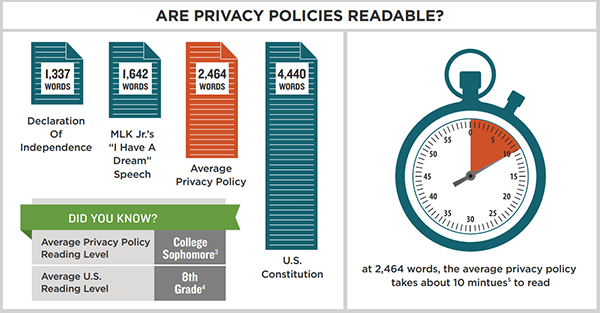In 2019, privacy policies are omnipresent. We’ve all seen them, we’ve all scrolled quickly to the bottom of the page, and we’ve all clicked “I accept,” granting us access to the wonders of the internet. But when you are presented with a privacy policy on a website, how often do you actually read it?
If your answer to the above question is somewhere in the realm of never, you are not alone. In fact, according to consumer advocates across the ditch, 94% of Australians do not read all the privacy policies that apply to them. As much as we might like to think we’re better readers than Australians, the figures in New Zealand are probably very similar.
The reality is most privacy policies are far too long and complex for any regular internet user to read and understand. As far back as 2008, researchers estimated it would take the average person 244 hours to read the privacy policies on all the websites they visit each year.
More recently, The Atlantic estimated it would take 76 work days to read the privacy policies of every website you visit in a year. That means you would have to read full-time from the first of January through to mid-April before you knew all the ways your information could be used by online companies.
By 2014, the privacy policies of the 50 most popular American websites had collectively ballooned to 145,000 words, about as long as The Grapes of Wrath. When plotted on a graph alongside other works of classic literature, the privacy policies of many popular websites are considered more difficult to read than Charles Dickens’ Great Expectations, Stephen Hawking’s A Brief History of Time, and Immanuel Kant’s infamously dense Critique of Pure Reason.
For a visual representation of the problem, Dima Yarovinsky’s art project I agree makes it very clear. Yarovinsky printed out the terms of service for seven major tech companies to highlight their length and complexity. Instagram, Snapchat, and Facebook’s terms of service are so long they sprawl off the gallery walls onto the floor.
Despite their ubiquity, long and intricate privacy policies are inaccessible to the average internet user. Most people don’t read them, and many people wouldn’t understand them if they did. The internet is an increasingly complex place, particularly when it comes to individual privacy. As the online world continues to envelop every aspect of our lives, calls for privacy policies that people can realistically read and understand will only get stronger.
Back



